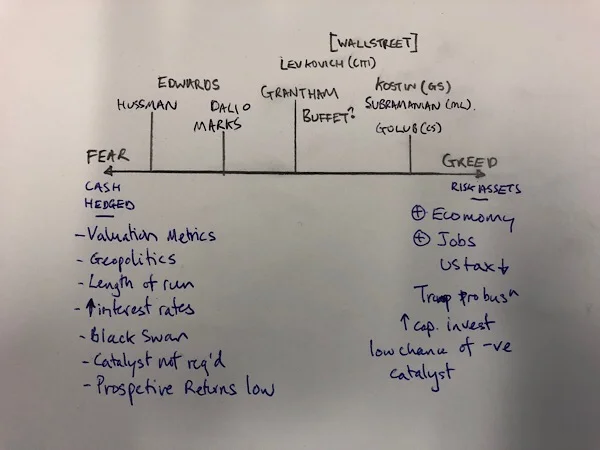Charlie Munger is the (older) long time business partner of Warren Buffet, and billionaire investor in his own right. He is Chairman of the Daily Journal Corporation (since 1997) which is legal publishing and software business with a portfolio of investments on the side. The AGM serves as a Q&A of Charlie Munger wisdom more than a scrutiny of the Daily Journal business. The business itself is in the $40m sales range, so not large in the world of big business.
These are some comments from his recent AGM.
On GE and on culture: “what caused the failure of performance at General Electric? …part of it I would say, is the system at General Electric where you rotate executives through so different assignments as if they were so many army officers, building up a resume to see if they can become Generals. I don’t think that works as well as keeping people in one business for a long time and having them identify with the business, the way Berkshire does….”
"... How can an outsider really know a company’s culture? And then finally how do you go about assessing the culture of a company like General Electric..,
…you understand culture best where it’s really dominant. So for a place like Costco, and there the culture is a vast and constructive force. And it will probably continue for a very, very, long time. And then you get into General Electric, part decentralized, partly not. And it gets very complicated. What is the culture of General Electric? The businesses can be so radically different.
Maybe headquarters can have a certain kind of culture. .... And I do think it’s, there are very few businesses like Costco that have a very extreme culture ... basically one big business all the way.
And I love a business like Costco, because of the strong culture and how much can be achieved if the culture is great. But the minute you get into bigger and more complicated places, I mean can you talk about the culture of General Motors, or the culture of AT&T, it’s a very difficult subject.
What big businesses have in common is that they get very bureaucratic. That’s the one norm in culture is they get very bureaucratic. And this happens to the government too. Big governmental bodies. I don’t like bureaucracy. I mean it fixes a lot of errors, I don’t have any substitute for it though. But I don’t personally like big, bureaucratic cultures. I don’t think very much about big bureaucratic cultures.
I don’t know how to fix bureaucracy in a big place. I would regard it as a sentence to hell if they gave me some company with a million employees and told me to change the culture. I mean it’s hard to change the culture in a restaurant. If a business is already bureaucratic, how do you make it un-bureaucratic? It’s a very hard problem..."
On banks: "Banking is a very peculiar business. The temptations that come to a banking CEO are way, the temptations to do something stupid are way bigger in banking than they are in most businesses. Therefore it’s a dangerous place to invest. There are a lot of ways in banking to make your near term future look good by taking risks you really shouldn’t take for the sake of your longer term future. And so banking is a dangerous place to invest, and there are few exceptions. And Berkshire tries to be in the exceptions, as best it could. And I have nothing more to say on that subject except, I’m sure I’m right.”
On investing: "...the first rule of fishing is fish where the fish are. And the second rule of fishing is don’t forget the first rule. And investing is the same thing. Some places have lots of fish, and you don’t have to be that good a fisherman to do pretty well. Other places are so heavily fished that no matter how good a fisherman you are, you’re not going to do very well.
And the world we’re living in now, an awful lot of places are in the second category.
I don’t think that should discourage anyone. I mean life’s a long game and there are easy stretches and hard stretches and the younger generation has opportunities. And the right way to go through life is to take it as it comes and to do the best you can. And if you live to an old age, you’ll get your share ..."
"Thoughts on the valuation of software companies like Apple, Facebook, Google, Amazon, Alibaba. Are they overvalued, potentially undervalued, too early to tell?
Well my answer is I don’t know. Next question. "
Full transcripts available here. One of the best Munger speeches on how to think about a mental model of inversion can be found here.














